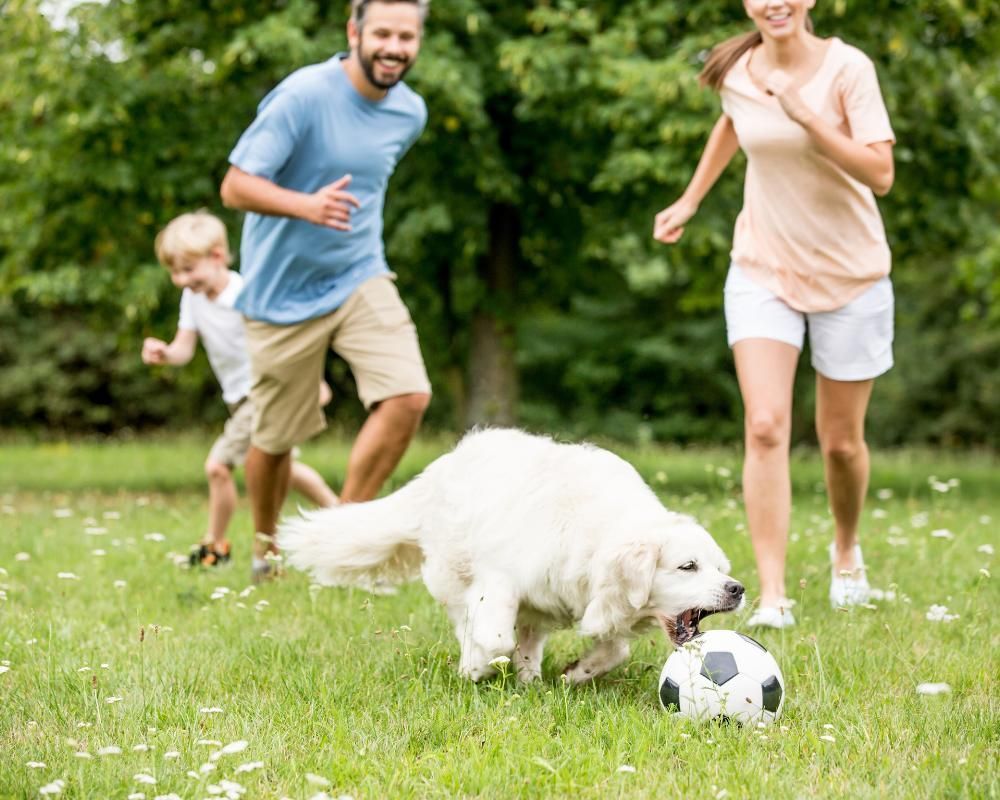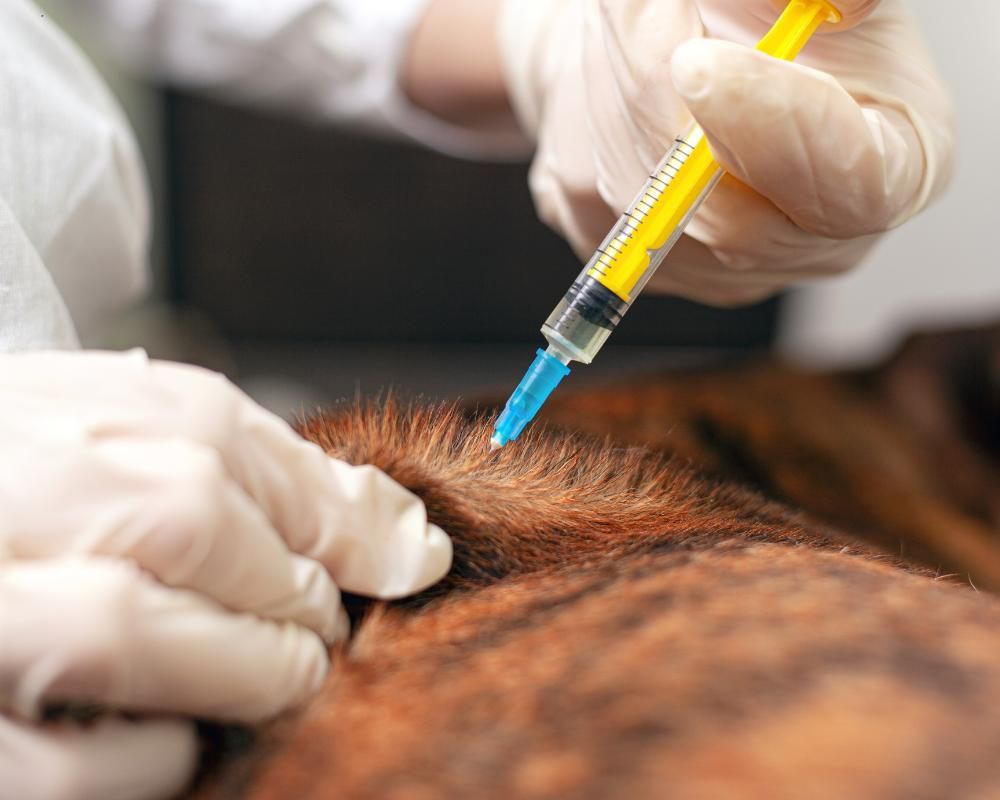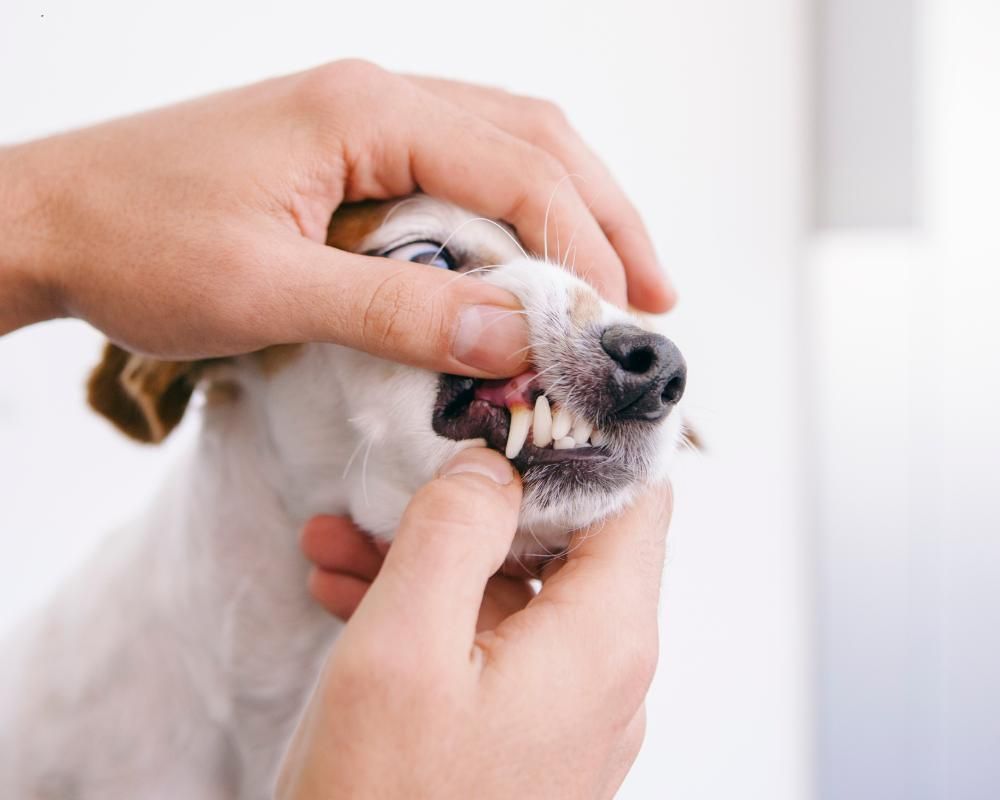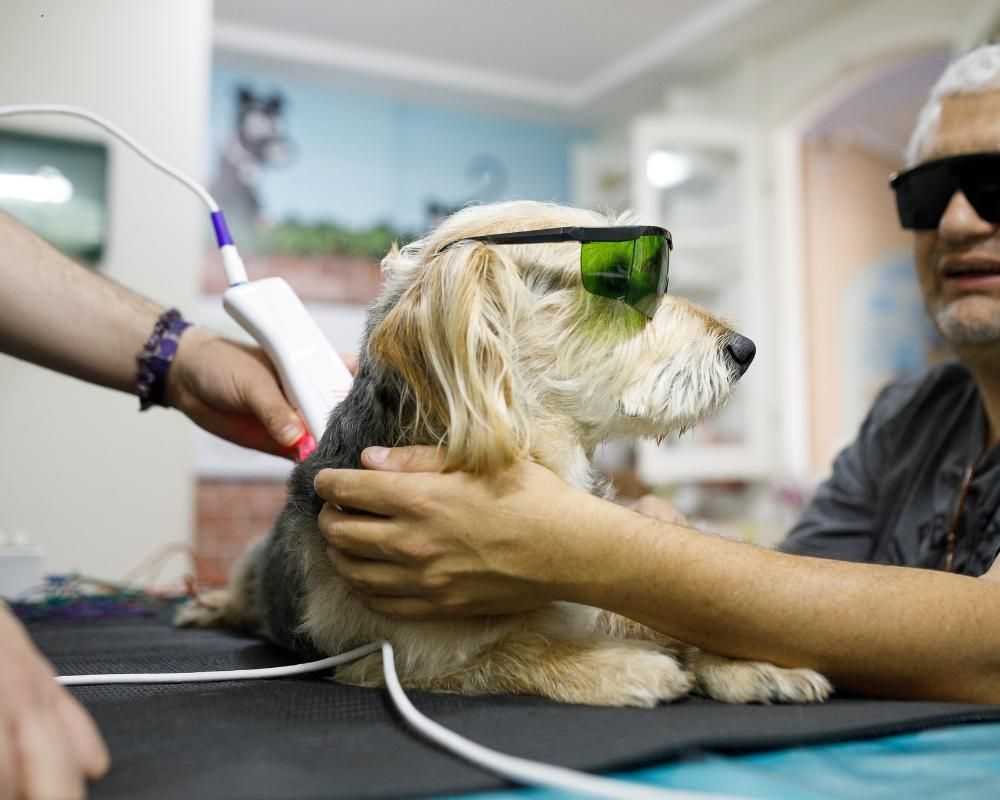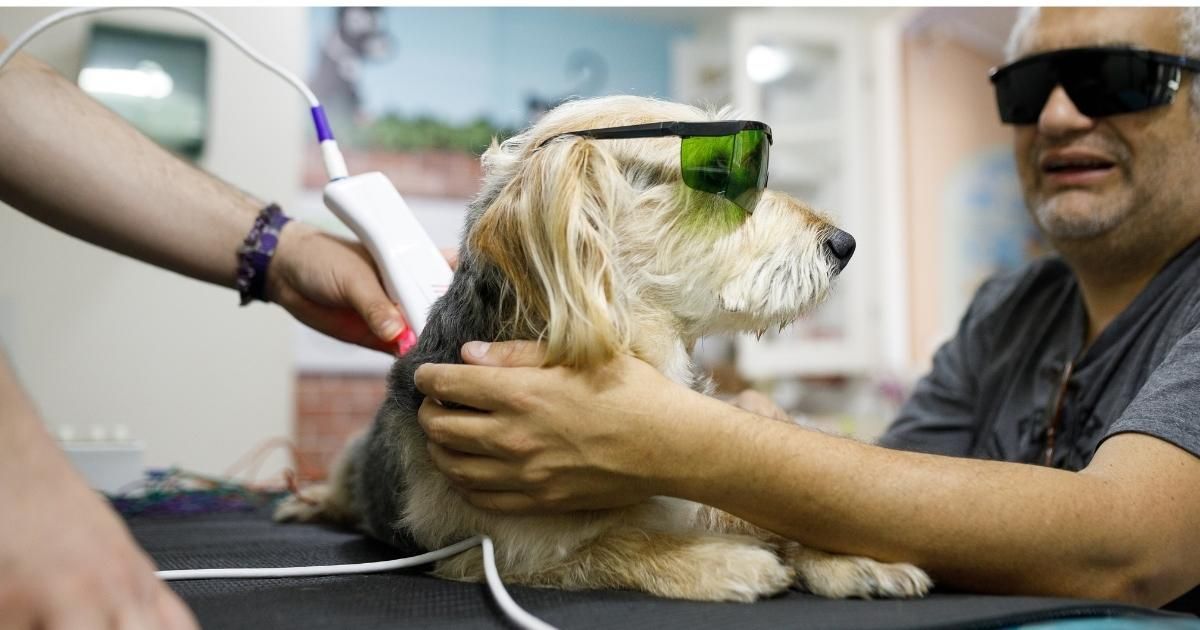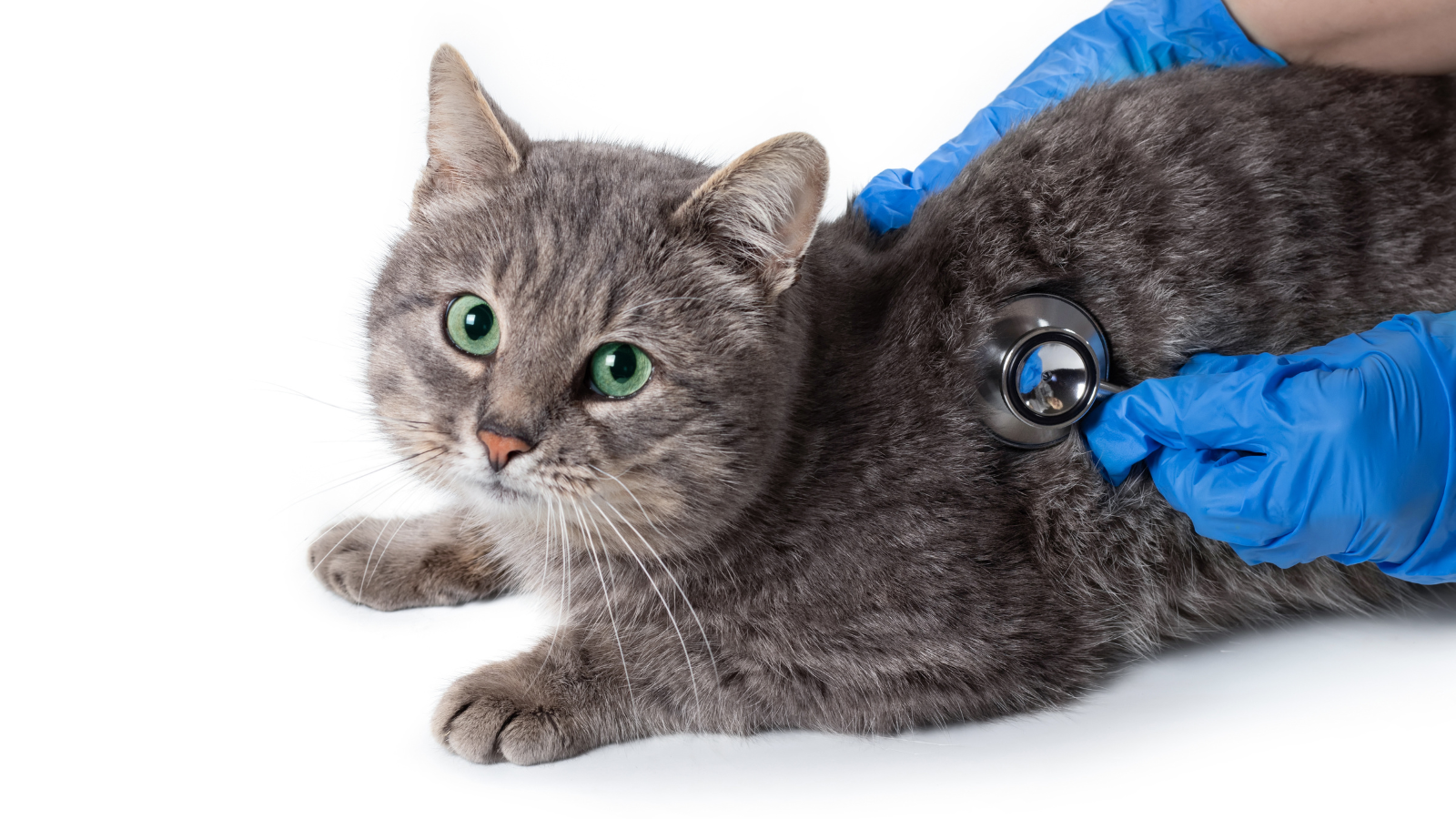Common Health Issues in Senior Dogs and How to Manage Them
June 28, 2024
As our beloved canine companion's age, it’s crucial to pay close attention to their health. Senior dogs are prone to a range of health issues, from common ailments to more serious conditions. Understanding these potential problems—and knowing how to tackle them—is essential for ensuring our furry friends lead happy and healthy lives to the fullest in their golden years. From the ability to identify diseases in old dogs to knowing the signs your senior dog is healthy, we’re here to shed some light on the importance of
senior dog care
for our aging pets by offering practical tips on how to respond to a dog’s most typical senior symptoms. By establishing and addressing these health issues early on, we can help our maturing mates maintain their vitality and quality of life.
In this article, we’ll explore common senior dog health problems, and we’ll describe effective strategies for handling them. According to the American Veterinary Medical Association (AVMA) “These changes can happen in the absence of any disease process as part of normal aging.” Emphasizing early identification and management of health issues for dogs as they age can lead to stronger, healthier lives for our devoted doggos. So, let’s dive in and learn how to distinguish various dog health issues, and more importantly, give them back a little of the loyalty they’ve shown us through the years, by learning how to provide the best possible care for the pooches approaching the well-deserved retirement era!
In this article, we’ll explore common senior dog health problems, and we’ll describe effective strategies for handling them. According to the American Veterinary Medical Association (AVMA) “These changes can happen in the absence of any disease process as part of normal aging.” Emphasizing early identification and management of health issues for dogs as they age can lead to stronger, healthier lives for our devoted doggos. So, let’s dive in and learn how to distinguish various dog health issues, and more importantly, give them back a little of the loyalty they’ve shown us through the years, by learning how to provide the best possible care for the pooches approaching the well-deserved retirement era!
Comprehensive Overview of Senior Dog Health Issues
Understanding common illnesses for dogs and other aging canine health problems is vital and could prevent your pet from experiencing more pain and discomfort than necessary. As our furry friends approach their golden years, they will likely face some kind of health challenge, but combing through all the material out there to educate yourself can be overwhelming and confusing. So, before you spend countless hours Googling things like “dog breathing problems old age” or “old dog having trouble getting up” only to see the infinite search results available from the spectrum of sources—whose validity varies—allow us to simplify the learning process for you in our complete overview of senior dog health problems!
We’ll take a deep dive into the world of common health problems in dogs as they age, arming you with credible recommended treatment plans for some of the most prevalent canine complications. We’ll get into things like respiratory issues, mysterious lumps, aging eyes, and mobility obstacles, and uncover the protocol to take care of the pesky predicaments that tend to just come along with aging. Staying informed and proactive about dog health conditions is essential to recognizing problematic signs and symptoms, so we’ll dig deeper into all your senior canine concerns. By the end of this review, we’ll have examined everything we need to know to get our ‘ole buddies’ the timely intervention it takes to ensure they lead fulfilling and comfortable lives, so you can confidently care for not just your pet, but for someone we realize is likely your best friend. As fellow animal lovers, we’re excited to help you navigate the signs your senior dog is healthy and, if not, to recommend some legitimate ways to get there!
We’ll take a deep dive into the world of common health problems in dogs as they age, arming you with credible recommended treatment plans for some of the most prevalent canine complications. We’ll get into things like respiratory issues, mysterious lumps, aging eyes, and mobility obstacles, and uncover the protocol to take care of the pesky predicaments that tend to just come along with aging. Staying informed and proactive about dog health conditions is essential to recognizing problematic signs and symptoms, so we’ll dig deeper into all your senior canine concerns. By the end of this review, we’ll have examined everything we need to know to get our ‘ole buddies’ the timely intervention it takes to ensure they lead fulfilling and comfortable lives, so you can confidently care for not just your pet, but for someone we realize is likely your best friend. As fellow animal lovers, we’re excited to help you navigate the signs your senior dog is healthy and, if not, to recommend some legitimate ways to get there!
Breathing Problems and What They Mean
As our furry friends age, it’s not uncommon for them to experience breathing difficulties, which is just one of several dog health problems attributed to old age. Whether it’s wheezing, coughing, or labored breathing, these symptoms can be alarming. However, many underlying issues, such as respiratory infections or heart disease, could be causing these problems. The AVMA tells us that “pulmonary alveoli enlarge and coalesce [with advancing age in dogs], leading to reduced lung elasticity and decreased surface area for gas exchange. In addition, control of breathing has been shown to be altered with age in dogs, with decreases in ventilation and responses to hypoxia during slow-wave sleep.” It’s essential to consult your veterinarian promptly to diagnose the root cause of changes in respiratory behavior as senior dogs age, provide appropriate treatment, and ensure your dog can breathe properly. Chipman Road Animal Clinic proudly offers only the most professionally thorough exams to get to the bottom of any respiratory struggles, so your dog can breathe easy once again!
The Mystery of Lumps in Older Dogs
A common question for many pet parents is, “Why do older dogs get lumps?” If you’ve ever noticed bewildering bumps or lumps on your aging pup, they can be a distressing sight, but as senior dogs age, it’s quite common to start noticing them. These lumps, often referred to as “lipomas,” or “fatty tumors,” are typically benign. Chances are, it’s just a typical sign of aging, but they can occasionally mean more serious conditions, such as cancer. If you notice any new lumps or changes to existing ones, don’t hesitate to schedule a vet visit with your local veterinarian like Chipman Road Animal Clinic for the peace of mind that comes with getting your pup a proper diagnosis!
Eye Problems in Aging Dogs
There are various old dog eye problems that, as our cuddly companions age, can affect vision and overall well-being. And just as chronic conditions and diseases like cataracts and glaucoma can impact a human’s quality of life, the same goes for dogs, and unfortunately, eye issues are among the most frequently diagnosed dog health problems. Symptoms like cloudiness, redness, or discharge should prompt a visit to the vet for a thorough eye examination. Treatment options may include medications, surgery, or simple lifestyle adjustments to ensure your senior dog enjoys the clear vision we all need to live a happy and comfortable life. According to the AVMA the “development of cataracts and nuclear sclerosis… could reflect functional changes in skin and coat, weight, body condition, and vision health.” If you’ve noticed any indication your dog is expressing symptoms of irritated eyes, Chipman Road Animal Clinic is more than happy to help you cope with caring for it compassionately and effectively!
Diseases Commonly Affecting Old Dogs
It can be difficult for pet parents to watch some of the side effects of senior dogs and health problems they run into more often with age. And just like us, dogs become more susceptible as their lives progress to certain things that have a negative impact on their quality of life. So, before we let that happen to our sidekick softies, let’s talk about some of the “health hiccups” that can come along when they hit their golden years. We’ll dive into some relevant, age-related dog health issues that often sneak up on older pups and share our tips on how to keep them feeling their best. Because no one likes watching their best buddy struggle to get up off the couch, and if you know the heartbreak that happens when you catch a worn-out weariness in their eyes, then you have unlocked the secret to sensing that something’s just “off” with your ordinarily perky pal. Look, no one knows your closest companion quite like you do, so if your “inner voice” is telling you something’s up, listen to it. Because when it comes to diseases in old dogs, it’s always best to stay ahead of them, and be proactive before they progress into becoming even more serious and cause more misery and melancholy. As the American Animal Hospital Association (AAHA) gently reminds us, “Your pet’s body will change with age, and your veterinary team can recommend lifestyle changes or products that can help your furry pal continue to enjoy life well into their golden years.” So, let’s look at some of the ways in which we can be there for our buddies, so they can continue to curl up next to us for many more healthy years to come!
Arthritis and Mobility Issues
Over time, our bodies may not operate at the capacity of full functionality as they once did, and your dog is no different. One of the most tell-tale signs of arthritis is when an old dog is having trouble getting up and down and moving around. If you notice a slowness in your older doggo’s movements or suspect anything from a strain in their step to a stiffness in how they shift positions, there’s a good chance there’s some suffering—or at the very least, some discomfort—going on. Arthritis is one of the most common diseases in old dogs, and other signs your dog is trying to communicate its symptoms are: licking or chewing at one of its joints; sluggish stair climbing or slowness to get on furniture; changes in gait, appetite, and/or sleep, and more panting than usual (unrelated to heat). When you’re trying to assess which dog health issues your senior sidekick might be facing, watch for behavioral changes. Being in a grumpy mood—or even moments of uncharacteristically aggression—can also be indicators of arthritis.
Major Health Conditions to Monitor
Alright, let’s take a look at some of the major dog health problems our furry friends can face as they age. We know they sound scary, but the right routine of wellness checks, preventative action and early detection are game changers for these diseases in old dogs. So enough of the “doom and gloom”—let’s talk about keeping our senior dogs in tip-top shape! As our furry friends age, there are a few pesky problems we need to keep an eye out for.
And there you have it, pet parents—a little bit of knowledge and a whole lot of love can go a long way in keeping our senior pups happy and healthy for years to come! And at Chipman Road Animal Clinic we offer all the compassion it takes to care for all of these conditions, and more! Schedule a visit today, and make sure your dog lives the longest and healthiest life possible!
- Heart Disease: First up on the list of canine health problems, we’ve got heart disease—yep, dogs can get it too! Watch out for signs like coughing, fatigue, or difficulty breathing, and be sure to schedule regular checkups with your vet, to stay ahead of any heart-related issues.
- Kidney Disease: Next on the list is kidney disease. This sneaky old dog’s disease can creep up on older pooches, so keep an eye out for symptoms like increased thirst, weight loss, and changes in urination habits. By catching it early, you can work with your vet to manage the condition and keep your buddy feeling their best.
- Diabetes: And let’s not forget about diabetes—it’s not just a human thing, it’s a common illness for dogs, too! Keep an eye out for symptoms like excessive thirst, frequent urination, and sudden weight loss. Early detection is key here, folks! By monitoring your ‘ole dogs’ diet and keeping them active, you can help prevent diabetes and keep them living their best life.
- Cancer: Last but certainly not least, we’ve got cancer. Of all the common health problems in dogs, this one is probably the scariest, but catching it early can make all the difference in the world. Keep an eye out for lumps, bumps, or any changes in behavior or appetite, and don’t hesitate to schedule a visit if something seems off.
And there you have it, pet parents—a little bit of knowledge and a whole lot of love can go a long way in keeping our senior pups happy and healthy for years to come! And at Chipman Road Animal Clinic we offer all the compassion it takes to care for all of these conditions, and more! Schedule a visit today, and make sure your dog lives the longest and healthiest life possible!
Practical Tips for Caring for Your Senior Dog
Fellow dog lovers! It’s time to roll up our sleeves and dive into some practical tips for giving our senior pups the love and care they deserve in their golden years and preventing some common dog health issues with some basic general wellness. Here are some actionable pieces of advice for how to care for your senior dog:
By following these practical tips, you minimize your senior dog’s health problems, and ensure your they enjoy a long, happy, and healthy life by your side. After all, they’ve given us so much love and loyalty through the years—it’s only fair we return the favor!
- Tailored Nutrition: As our pups age, their nutritional needs change too. Consider switching to a senior-specific diet that’s easier on their aging digestive systems and packed with nutrients to keep them feeling their best.
- Regular Exercise: Yep, even our older pooches need to stay active! But keep it low-key and gentle—think leisurely walks, chill games of fetch, or even some supervised swimming to keep those joints moving without overdoing it. It’s a great way to not only keep them in better physical shape, but also keep them mentally engaged, provide potential opportunities to interact with their social surroundings and prevent many diseases in old dogs.
- Comfortable Environment: Make sure your pup’s living space is cozy and comfortable. Invest in a supportive bed to cushion their achy joints and keep them warm during those chilly nights!
- Regular Vet Checkups: Just like us, our senior dogs need steady well checks to stay on top of their health and make sure we’re seeing all the signs your senior dog is healthy. Schedule routine visits with Chipman Road Animal Clinic to catch any potential issues early and keep your pup feeling their best.
- Dental Care: Don’t forget about those pearly whites! Dental issues turn into health issues for dogs too and can crop up as our pups age, so be sure to brush their teeth regularly and schedule professional cleanings as needed.
- Mental Stimulation: Keep your senior pup’s brain sharp with plenty of mental stimulation. Puzzle toys, interactive games, and even obedience training sessions can help keep their minds active and engaged!
- Lots of Love: We know you’ve developed some of this for your developed doggo. Of course, it’s always important to shower your senior pup with plenty of love and affection. When we ask ourselves, “What is old age for a dog?”, no age is ever too old for some good ‘ole T.L.C., and nothing quite brings your pooch the same kind of comforting satisfaction your attention does. We may seem like Captain Obvious here, but it’s easy to let time get away from us and devote less of it to our dogs as they get older, but as they approach their crossing of the Rainbow Bridge, it’s more important than ever to cherish them in these last precious years we have with them. So, whether it’s spending quality time together, snuggling on the couch, or going for a leisurely stroll, any of your favorite pastimes are great ways to squeeze in some more bonding. But even if it’s just being with each other—keeping your furry friend feeling happy and loved is some good medicine—for both your souls!
By following these practical tips, you minimize your senior dog’s health problems, and ensure your they enjoy a long, happy, and healthy life by your side. After all, they’ve given us so much love and loyalty through the years—it’s only fair we return the favor!
Dietary Considerations for Senior Dogs
When it comes to dietary considerations for senior dogs, opt for a high-quality, senior-specific dog food that’s easy on their aging digestive system, and packed with essential nutrients to support their overall health and well-being. Additionally, consider incorporating supplements, like glucosamine and omega-3 fatty acids to support joint health and cognitive function in older pups.
The Role of Regular Veterinary Check-Ups
Asking “Why Are Regular Veterinary Visit Important” is perfectly outlined in the American Animal Hospital Association’s (AAHA) outline on the subject. Although your dog’s individual age and diagnosis, as well as the existence of any other chronic health issues may likely require a more frequent specified care plan, most dogs should be seen by a vet for routine care once a year. This allows their provider to establish a baseline of their overall health, detect signs of diseases in time to properly manage them, and determine the inevitable changes your dog’s age will inevitably cause. These checkups are the lifeblood for preventative care, and really can be a gamechanger in your dog’s long-term health. Schedule your visit today with Chipman Road Animal Clinic where we’ll be devoted to your dog, who we believe is destined for a journey to wellness and deserves the best senior canine care possible!
Address Senior Dog Health Issues to Prolong Their Life
Although the signs of aging can vary depending on the different issues each individual dog experiences, and although they can often be scary for pet parents, one thing is for sure—it’s our job to help them avoid common dog health problems and feel their best in this transformative phase of life. In some cases, our dogs have spent their whole lives, showing us a level of commitment, we have found nowhere else. And now, as they approach their later years, they’re probably slowing down, and facing some canine health problems. Maybe their naps have gotten longer. Their whiskers are likely greying, and maybe the deep sighs and groans have become more frequent. But regardless of how silvery their coats become, they have even more love for us than ever, and the moments we have with them become even more treasured at this time. So, whether you’re seeing changes in their appetite or sleep patterns, noticing their energy levels decrease, or feeling a little alarmed about a bump you recently found under their leg, it’s more important than ever to pay close attention to the signs of common illnesses for dogs. Watch and listen for those helpful hints your pooch is putting out there for you to pick up and respond to. And whether it’s with Chipman Road Animal Clinic or another trusted provider, make sure to schedule a well check today, to make sure you see the signs your senior dog is healthy, and protect them against all the potential health threats they face as they age.
Chipman Road Animal Clinic in Lee's Summit Provides Excellent Solutions for Common Senior Dog Health Problems
To consult with a professional veterinarian about the concerns your senior dog may encounter in the coming years, contact our expert staff at
Chipman Road Animal Clinic
today. We accept walk-ins for new and established clients! We look forward to managing your precious pooch’s care, and making sure you’re armed with all the information you need to provide comfort at home too!

